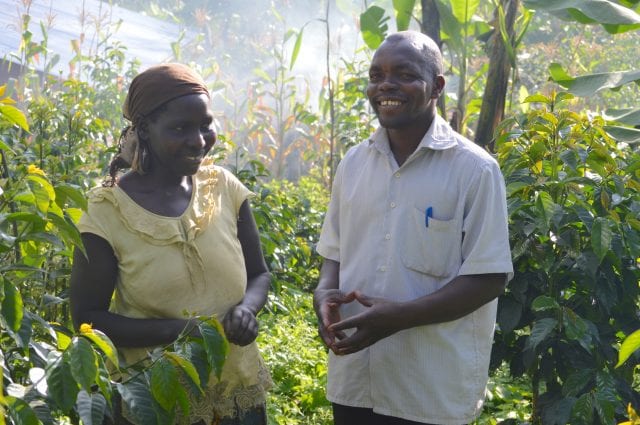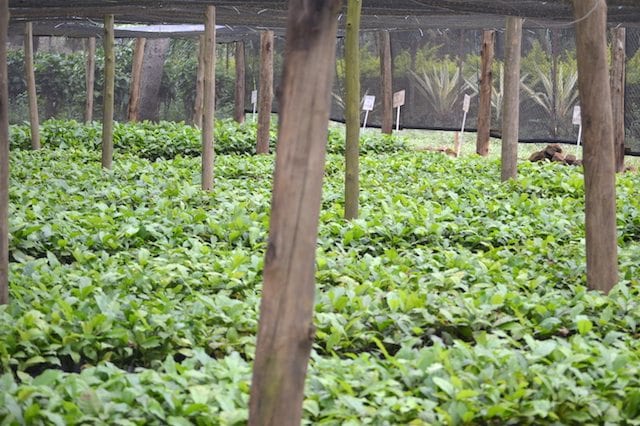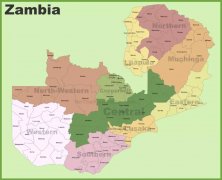How to develop boutique coffee in Uganda? introduction to the three major boutique coffee producing areas in Uganda

Not long ago, Ugandan specialty coffee was almost unheard of. This East African country is mainly famous for its Robusta crops. But times are changing: Arabica coffee production has boomed over the past decade, and Uganda has begun to become famous among the third wave of roasters and coffee lovers.
What's so special about Ugandan coffee?
Uganda is an excellent place to grow coffee. Armed conflicts have damaged the industry over the past few decades, especially in the West Nile producing area of the in the 1990s. However, the country has fertile land, volcanic soil in both East and West, and abundant rainfall. There were two bumper harvests in some parts of the country: April to June and October to February.
In some places, farms can hold up to 2300 degrees Celsius, and the resulting lower temperatures lead to more complex coffee. These farms are small, usually less than half a hectare. Intercropping provides a good shadow under which coffee can grow-another factor that lowers the temperature and makes plants healthier.
Processing after washing is very common, although you will also find some naturally processed coffee. There is a wide variety of naturally processed coffee, from low-quality, low-quality coffee beans to high-quality, professional coffee beans.
Danny Bee, the 2016 UAE baristas champion finalist, told me that Uganda's diverse habitats produce a variety of flavors, from sun-dried tomatoes to floral scents. "adequate sunshine and Rain Water have led to the slow development of Ugandan Arabica coffee, which has produced coffee beans with full flavor," he explained. "
Rubens Gadley (Q. Grader), four Italian baking champions, two Italian Brewer Cup champions, a world blues cup champion runner-up, and the owner of Gadley coffee also appreciate Ugandan coffee. In fact, he chose to use the country's coffee beans in the competition-and hopes to use it with more Ugandan coffee in the future.

Improve farming and processing methods
For Rubens, the decision to use Ugandan coffee was based on his ability to work with small farmers to improve the quality of production and processing. He told me that the farmers in question had successfully implemented his advice and got a bumper harvest (and premium prices).
Rubens is not the only one impressed by Uganda's willingness to adopt characteristic agricultural methods. We interviewed Anneke Fermont, regional sustainability manager at Kyagalanyi Coffee. Kyagalanyi Coffee, a coffee company in Uganda, is a sister organization of true origin. Anneke works with more than 60 field workers to provide different services to about 12000 Arabica coffee growers.
Anneke told me that Uganda is increasingly recognized for the quality of its Arabica coffee, which is the result of "10 years of training for small farmers to improve the quality and attention to detail of their coffee."
For example, Kyagalanyi Coffee processes each batch of coffee separately. "[we can] provide full traceability of all batches to each batch of coffee suppliers," Anneke explained.
Faith Asaji, head of quality control at Kyagalanyi Coffee, told me a similar story. She says quality has benefited from improvement, thanks to the construction of wet mills close to farmers and bonuses for model crops. These bonuses are provided in the form of "cash or fertilizer, provided by reputable suppliers at the right time of the year, and provide advice on the needs of each area".
She continued: "because of the work we have been doing, we believe that this season's coffee is not only the best coffee ever made in Uganda, but also a serious competitor to well-known producing areas."
Three Arabica coffee growing areas in Uganda
Uganda has long been known for its robusta coffee, a native species that is still wild in the country's rainforest. However, you will also find Arabica coffee growing in three areas: Mount Elgon in the east, Mount Rwenzori in the southwest and the West Nile in the northwest. Each producing area is unique and has different coffee characteristics and production methods.
Elgon, Mt.
Mount Mount Elgon, located on the country's eastern border with Kenya, is actually the oldest volcano in East Africa. Coffee farms perch on both sides, are covered with forests and get important water from steep ditches. At lower altitudes, the harvest season is from June to December; at higher altitudes, it does not begin until July and will last until February.
In boutique farms, cherries are usually selected by hand and then cleaned. Because of the steep terrain, transporting coffee can be difficult-in some places, donkeys with hairy feet are the best way to transport safely from the farm to the factory.
The Bugisu area on the Shanxi slope of Elgon is famous for its fruity, coffee-like coffee. But, more often, you will taste sweet orange coffee with raisins and figs, such as coffee from Gibuzali and Kapchorwa washing stations.
Organic farming is the norm, but fertilizer use is also growing slowly. More importantly, Kyagalanyi Coffee has been working with farmers to encourage caking, thereby increasing coffee productivity.

West Nile River
The West Nile region is located in northwestern Uganda with between 1300 and 1600 farms. Indigenous trees such as banyan trees are used as shade for generations of farms. Coffee from the region is usually cleaned and is famous for its citrus aroma.
Renzori Mountains
The mountain range, commonly known as Moon Mountain, is located on the southwestern border between Uganda and the Democratic Republic of the Congo.
Coffee grows on hillsides between 1500 and 2300 Masra above sea level. The nitrogen-rich soil in the volcano creates a very suitable soil for coffee. Natural processing is the most common here, although you can also find a method of washing.
As coffee professionals in Uganda focus on quality, the country's Arabica coffee begins to attract attention because of its sweetness and citrus flavor. Faith believes that this situation will only continue in the future. " [Uganda] has great potential and we are just beginning to really take advantage of it," she said.
Important Notice :
前街咖啡 FrontStreet Coffee has moved to new addredd:
FrontStreet Coffee Address: 315,Donghua East Road,GuangZhou
Tel:020 38364473
- Prev

Zambian Cates and Senya Coffee Manor introduce the flavor of Zambian honey-treated coffee
Sub-region: northern Province Farm name: Kateshi Isanya Estates processing: honey treatment Certification: rainforest Alliance Plant varieties: Arabica Coffee Grade: ZMB CA WA HP altitude: 1300-1700m this specially processed honey-processed coffee comes from Isanya and Kateshi estates in the northern provinces of Zambia. This season, from Isanya
- Next

Coffee characteristics of South Minas Valley Farm in Brazil will the fruit tone of yellow bourbon be better than that of bourbon?
Country: Brazil: Sul de minas altitude: about 1350m handling: sun varieties: Yellow Bourbon Certification: UTZ Certification Award: best Coffee Award in the Sao Paulo State Seventh Special Coffee Competition the Fifth ABIC National Coffee Competition Champion and Vice Champion Brazilian Coffee Association (BSCA) 9th specialty coffee competition flavor description: sweet maltose
Related
- Detailed explanation of Jadeite planting Land in Panamanian Jadeite Manor introduction to the grading system of Jadeite competitive bidding, Red bid, Green bid and Rose Summer
- Story of Coffee planting in Brenka region of Costa Rica Stonehenge Manor anaerobic heavy honey treatment of flavor mouth
- What's on the barrel of Blue Mountain Coffee beans?
- Can American coffee also pull flowers? How to use hot American style to pull out a good-looking pattern?
- Can you make a cold extract with coffee beans? What is the right proportion for cold-extracted coffee formula?
- Indonesian PWN Gold Mandrine Coffee Origin Features Flavor How to Chong? Mandolin coffee is American.
- A brief introduction to the flavor characteristics of Brazilian yellow bourbon coffee beans
- What is the effect of different water quality on the flavor of cold-extracted coffee? What kind of water is best for brewing coffee?
- Why do you think of Rose Summer whenever you mention Panamanian coffee?
- Introduction to the characteristics of authentic blue mountain coffee bean producing areas? What is the CIB Coffee Authority in Jamaica?

